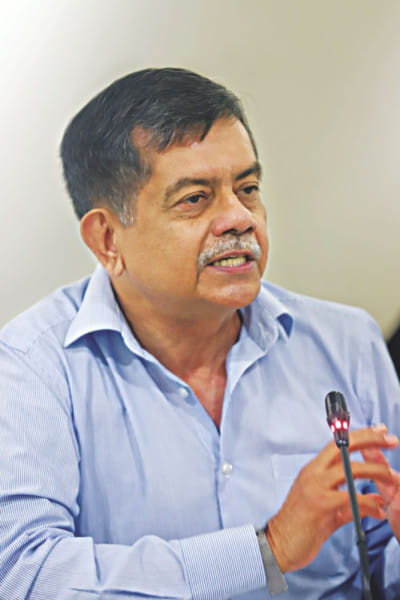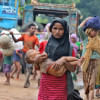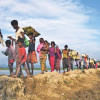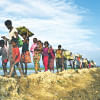Rohingya case, a litmus test for the world community

In spite of its pledge to repatriate the Rohingya refugees from Bangladesh, Myanmar has done little to keep its word. How seriously should Bangladesh and the international community take Myanmar's promises at this point?
There is no reason to believe that Burma's pledge to repatriate the Rohingyas is genuine. Since August 2017 it has not given any indication of being serious about creating an enabling environment for the return and rehabilitation of the refugees. Instead of being remorseful for its genocidal acts, the Burmese political and military leaderships continue to heap the blame on the victims. Thus far, the perpetrators have not been brought to justice.
This is not a standard case of repatriating refugees fleeing a one-time persecution or other forms of human rights violation. Rohingyas are the victims of four-decades-long systematic genocide at the hands of the Buddhist-Bhama regime that has dismantled the structures of protection that the Rohingyas enjoyed during the colonial era and also until the early 1960s. They have methodically been subjected to discriminatory laws and have had their citizenship rights and other entitlements stripped away. No less important has been the periodic unleashing of state violence triggering massive refugee flows (1978, 1991–92 and 2017). We should also bear in mind that since 1991–92, the Burmese state has been engaged in a sustained low intensity genocide against the Rohingyas in Arakan. It led to small batches of Rohingyas coming to Bangladesh. That number swelled to 200,000 to 300,000 by August 2017. This went largely unnoticed by the world community.
Rohingya repatriation is not simply a case of signing accords between concerned parties, working out the modalities for repatriation involving technical experts including those of the UN and generating funds; it is a case where the root causes of the problem need to be addressed and conditions created for refugees to safely return home. When oppressors are still in power and the Burmese state refuses to accept monitoring visits by Office of the High Commissioner of Human Rights, the UN Fact Finding Mission and the country Special Rapporteur, there is little reason to believe that "safe, dignified, voluntary and sustainable return" can be ensured. It will be worthwhile to recall the opening statement of the UN High Commissioner for Human Rights Zeid Ra'ad Al Hussein at the 38th session of the Human Rights Council on June 18 that, "no repatriation should occur in the absence of sustained human rights monitoring on the ground, in the areas concerned."
Thus, there is no scope for Bangladesh and the international community to take the Burmese promise seriously. It's only a ploy to hoodwink the world.
What have been the biggest factors you think that have allowed Myanmar to so blatantly continue its campaign of persecution against the Rohingyas?
For decades the Rohingyas have been subjected to discriminatory laws, harsh treatment, denial of citizenship status, and banishment to other countries; yet, the world failed to take notice of their plight. Rohingyas were a dispensable lot for the powerful members of the world community. This gave the Burmese state a free-hand in pursuing their long-drawn agenda of expelling Rohingyas from Burma.
For a long time, the Burmese authorities crafted various legislative and administrative measures to ensure institutionalised discrimination against the Rohingyas. When those were being framed and implemented there was hardly any noise from anyone. The large-scale expulsions of 1978 and 1991 drew international condemnation but the slow burning genocide that made life untenable for the community in Arakan for decades drew very little international attention. While the UN agencies were in cahoots with the Burmese government's implementation of so-called development plans including conducting a questionable census that denied the Rohingya their group identity and overlooking human rights violations in Arakan, the powerful states were busy striking out various deals with the Myanmar regime to outwit their rivals.
The Rohingya case is a litmus test for the world community. The big powers, including the permanent members of the United Nations, appear to have jettisoned their prime responsibility in upholding global peace and security in favour of their own self-interest. This has seriously undermined the efficacy of not only the UN system, but also the international human rights regime. It is an utter shame that in the 21st Century, despite the existence of a plethora of international human rights conventions, the Burmese rulers have been allowed to pursue their genocidal agenda with such impunity.
What role can the International Criminal Court (ICC) play now that Bangladesh has sent its information and observations to the ICC?
Dhaka has made a very significant contribution to the efforts to establish international accountability by officially responding positively to the ICC Pre-Trial Chamber's questions on (Dhaka's) legal perspective and competence and willingness to cooperate with the ICC in the prospective case against Burma. Should the Court proceed to investigate the Prosecutor's allegation against Burma, this judicial process cannot be vetoed or derailed by the Security Council where China most likely would take Burma's side. The ICC Prosecutor's move is unprecedented and could potentially lead to the establishment of an international criminal tribunal on Burma (ICTB). The current generation of Rohingya survivors may see justice delivered in their lifetime. Burma's State Counsellor Aung San Suu Kyi and the senior most generals with ultimate command responsibility may find themselves in the dock. The future ICT on Burma may also help strengthen the argument that Rohingyas will need international protection in returning to their homeland and reconstruction efforts once there, because as a state, Burma is incapable of establishing its own justice and accountability measures for the actions of its leaders.
Realistically, how can Bangladesh ensure that the Rohingya refugees are able to return home as quickly as possible without further threats of violence against them? What other countries can influence Myanmar the most to work towards such an end and how?
It is unfortunate that Bangladesh is a neighbour of this rogue state. Bangladesh's intention and efforts to bilaterally address the problem have been met with a series of rebuff and trickery from Burma. In deference to the Burmese authorities Bangladesh has desisted from terming the community members as Rohingyas. During repatriation talks it also refrained from raising the issue of Rohingyas who previously came to Bangladesh. All these sincere good neighbourly gestures have been deemed as weaknesses by the Burmese state. It is time for Bangladesh to shed any hope for bilaterally solving the problem. Bangladesh needs to lead a sustained international campaign to highlight the Rohingya issue. Such a campaign should highlight how Bangladesh has been adversely affected by the crimes committed by the Burmese state, expose and document the nature of such crimes and demand prosecution of the perpetrators. It should also remind the international community about its responsibilities under the UN Charter and international human rights instruments. Bangladesh should remind India that it felt betrayed by the latter's action on the Rohingya question. After all, India had gained a lot from Bangladesh in addressing its security and connectivity concerns with its Northeast states. At the very least a neutral position was desirable.
The Rohingya issue is gaining traction, albeit slowly. Progressive legislators in the US, Canada, France and Germany have taken interest on the issue. Key officials in the UN system and the ICC have voiced their concern and demanded action. The global civil society, including the centres of academic excellence and various faith groups have begun to champion the Rohingya cause. Demands for reporting Burma to the ICC and the International Court of Justice are also being articulated. It is time for Bangladesh to actively engage with those initiatives by taking its own civil society on board. Recent experience of Burmese duplicity does not leave Bangladesh with any other option.










Comments